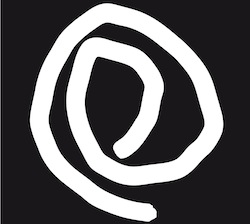Releases
 |
Scheer
Christian Wolfarth
hiddenbell records 008 / CD Zürich, 2013 Cover Foto: Christian Wolfarth
Christian Wolfarth - cymbals
"Jason Kahn, qui signe les notes de Scheer, confirme rapidement: Christian Wolfarth use ici de cymbales et de cymbales "seulement." Pas simplement, par contre, et d'une manière si efficace qu'elle lui fera écrire: "He presses time to the forefront of our perception, leading us to a hightened sense of the now and allowing us to reflect on this through the beauty of sound." Il n'était pas question de traduire l'impression de Kahn pour raconter l'éffet que peut avoir sur nous l'art de Wolfarth. Il faudra par contre donner les noms des références auxquelles Kahn compare ici Wolfarth (Eliane Radigues, Maryanne Amacher, Phill Niblock) pour insister avec lui sur la veine minimaliste de ces deux pièces enregistrées à Scheer, en Allemagne. Sur Scheer 1, c'est donc à quelques cymbales que le carillonneur s'accroche afin d'y dessiner au balai des reliefs assez hauts pour dissimuler d'épais ronflements. La balance des aigus et des graves est travaillée, leur histoire est celle d'une suite d'apparitions et de disparitions subtlilement coordonnées. Sur résonances impressionanntes, Wolfarth fera de Scheer 2 une berceuse ensorcelante. Des drones y naissent à force de régularité et s'épanouissent pour trouver dans le studio un beau terrain de prolifération. Deux fois donc, démonstration - faut-il enfin traduire les propos de Kahn rapportés plus haut pour dire ce que Wolfarth démontre ici ? - et son impressionnent tout autant."
Guillaume Belhomme (Le son du grisli, july 2014)
"Between 2009 and 2011, Swiss percussionist Christian Wolfarth released four 7"s presenting eight short examples of his playing. Utilising purely acoustic methods, they varied between remarkably electronic sounding drones to clattering asymmetrical rhythms with quite a range in between, and showed the process of Wolfarth finding a voice in what was already a widely researched area of sound. Scheer is a new solo disc of two pieces that consolidate those experiments in extended works. This time Wolfarth uses just cymbals, which is easily forgotten and at times almost unbelievable - the warmth underlying his bowed drones has a purity rarely heard elswhere. Scheer is a stunningly well-conceived and executed construction that shifts suddenly from long, intense drone sections to brief, viciously sharp percussive parts with an atmosphere of oppressive, imminent danger present throughout."
Richard Pinnell, (The Wire 361, march 2014)
„One of the more exciting players of percussion music, at least for me, is Christian Wolfarth. Perhaps because his music is not always sounding like percussion music, but that might not be the only reason. Wolfarth released an excellent series of 7″ records in which he played real time his kit and more often than not it sounded like something else. Here he plays cymbals only, and to a certain extend that is what we hear indeed. Certainly in the opening minutes of ‘Scheer 1′ this is the case. It’s hard to say what he uses to play these cymbals, here or further down the line but it might include anything that makes a sound: sticks, stones, styrofoam or shavers – translated in Dutch ‘Scheer’ would mean ‘Shave’. And perhaps he uses all sorts of motorik devices on these cymbals and thus generates a wealth of overtones. Maybe he uses a bow, maybe more than one. This sort of overtone playing is quite important on this album which consists of two pieces, but it’s not exclusively done with overtones. There is a bit of ‘stick’ playing to, here and there, and the recording is warm and beautiful. Very spacious as one feels the presence of the acoustic space in which the music was played and recorded. Sometimes reminding me of Jason Kahn – who wrote the liner notes – or drone masters like Radigue, especially the deep end drone of ‘Scheer 2′, but going through various moods and changes, Wolfarth has created a fine album of his own making, free of any reference or influence, it seems to me. A work of fine composition, me thinks, rather than improvisation.“
Frans de Waard, (Vital Weekly 913, january 2014)
